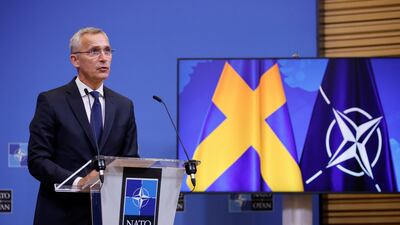Russia’s invasion of Ukraine has pushed Nato to focus on countering Moscow’s potentially increased influence in the Middle East, especially after the withdrawal of US troops from the region, experts told The National, as alliance members gathered for summit in Spain.
Nato’s growing influence in the Middle East is one factor in the discussions in Madrid at a key moment following failures in Afghanistan and internal discord during the administration of former US president Donald Trump, who threatened to pull Washington out of the alliance.
The alliance's role in the Arab world is linked to “domestic politics in Europe, especially with issues such as Ukraine war, Nato’s presence is also there to ensure that Russia doesn’t get its foothold in specific countries,” said Sajad Jiyad, a fellow at the Century Foundation in New York.
Nato was created in 1949 as a mutual defence bulwark against the Soviet Union to promote the security of the North Atlantic area. The group, based in Brussels, has grown to 30 member nations.
“They don’t want to see a Russian troop presence in Iraq and elsewhere, so Nato will prevent that from happening and will ensure it does not encroach into those areas by offering military presence or training programmes as it will allow them to extend their political influence,” Mr Jiyad told The National.
What can Nato do in the Middle East?
Michael Stephens, a senior analyst at the Foreign Policy Research Institute, said Nato understands there is a “repeated cause of instability that emanates from the Middle East that gives it a cause for concern but there isn’t that much it can do about it”.
For example, over the years, Russia has been strengthening its military infrastructure in the Mediterranean — giving rise to concern over unstable countries such as Libya and Syria, said Mr Stephens, who is also a fellow at the Rusi think tank.
“This plays in the minds of various thinkers but the question is, what to do about it, because Nato cannot do much, unless it poses a direct national security threat that emanates from that basing infrastructure,” he told The National.
Following Iranian strikes against US troops in Iraq that were carried out in retaliation for a drone strike that killed a top Iranian military commander in early 2020, Mr Trump urged Nato to increase its role in the Middle East.
Mr Jiyad predicts the region will see less of a US and more of a Nato military presence in the coming years.
“Nato’s mission is to give cover to the anti-ISIS coalition that is winding down and there’s been a long standing opposition to US military presence in Iraq and the region,” he said.
Iraq
Iraq is considered by Nato to be one of the most important countries in the Middle East.
“Iraq gives a sense of purpose to Nato members in the context of a post Cold War alliance,” said Renad Mansour, project director of the Iraq Initiative at Chatham House.
“It was looking for an identity and purpose and going to countries like Iraq and Afghanistan became Nato’s purpose to rebuild security sectors and to state build effectively as an alliance.
“So the Nato mission in Iraq became very important for that reason.”
The alliance was considering taking a role different from that of the Washington in Iraq, following the US troop withdrawal, but this is a challenge as the alliance includes the US, Mr Mansour said.
“Nato is tasked with supporting a reform within the security sector in Iraq, obviously something that has not worked for the last 20 years but they are trying to have some success in the security sector,” he said.
The alliance has had a non-combat, “train-and-advise” mission in Baghdad since October 2018 but plans to expand it were delayed, in part, by Covid-19 in 2020.
The alliance has taken over some of the training activities carried out by the US-led coalition against ISIS.
A western diplomat told The National that Nato's mission is more favourable to Iraqis than an American training force as it includes allies such as Turkey, Denmark and the UK.
“We will certainly see more of Nato in Iraq and the wider region,” the diplomat said.


